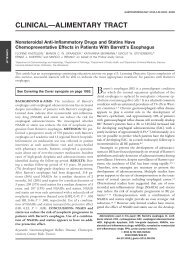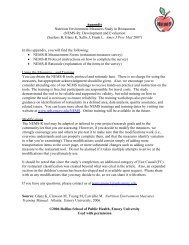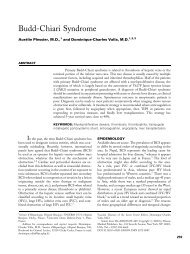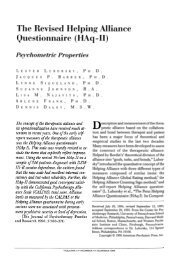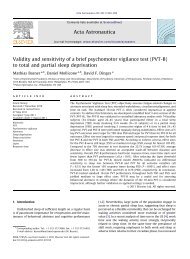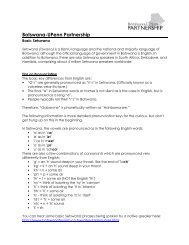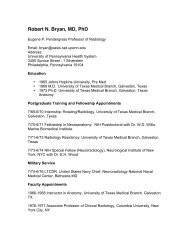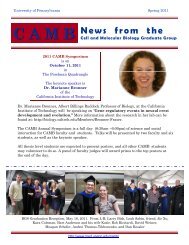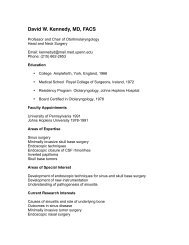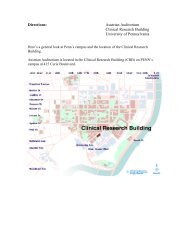PPP_Summer 2010_EDITED FINAL 072010:PPP.qxd - University of ...
PPP_Summer 2010_EDITED FINAL 072010:PPP.qxd - University of ...
PPP_Summer 2010_EDITED FINAL 072010:PPP.qxd - University of ...
Create successful ePaper yourself
Turn your PDF publications into a flip-book with our unique Google optimized e-Paper software.
PAGE 10<br />
Confinued from page 9<br />
son why Dr. Epperson was initially<br />
drawn to the area <strong>of</strong> women’s behavioral<br />
health. During her research fellowship<br />
at Yale in 1994, she developed<br />
a scientific interest in the role <strong>of</strong> hormones<br />
in mediating maternal behavior,<br />
a focus that grew out <strong>of</strong> her<br />
fascination with how normal maternal<br />
behavior can go awry following childbirth.<br />
She learned about the role <strong>of</strong><br />
oxytocin in maternal and affiliative<br />
behavior in mammals and was<br />
“astounded,” as she puts it, by what<br />
she discovered.<br />
“Finding out that a hormone, which I<br />
had been taught throughout medical<br />
school was important for uterine contractions<br />
during labor and milk letdown<br />
during lactation, was also critical<br />
to the initiation <strong>of</strong> such a complex<br />
behavior as maternal caretaking was<br />
eye-opening, to say the least,” she says.<br />
This new body <strong>of</strong> research suggested<br />
that oxytocin and ovarian hormones<br />
might impact the brain, an observation<br />
that challenged accepted dogma. “I<br />
knew then that I wanted to understand<br />
how these hormones interact with the<br />
central nervous system in humans to<br />
affect behavior across the female lifespan,”<br />
Dr. Epperson says. Her scientific<br />
achievements have earned her national<br />
and international recognition, significant<br />
grant funding, and publication in<br />
top-tier scientific journals.<br />
The PCWBW’s scientific priorities center<br />
on gaining a better understand <strong>of</strong><br />
how sex and gender impact behavioral<br />
health, particularly how hormonal<br />
fluctuations affect women’s behavioral<br />
health throughout the female reproductive<br />
lifespan. Ongoing research<br />
studies investigate hormone effects on<br />
the brain during pregnancy, postpartum/antepartum<br />
depression and anxiety,<br />
pregnancy loss and complications,<br />
severe premenstrual syndrome (commonly<br />
known as premenstrual dysphoric<br />
disorder), cigarette smoking<br />
and its effects on mood in women, and<br />
hormone effects on memory and mood<br />
during the menopause. The Center<br />
encourages all women to participate in<br />
clinical research studies as a way to<br />
ensure that women’s health issues are<br />
at the forefront <strong>of</strong> research break-<br />
throughs. Without the participation <strong>of</strong><br />
women in research, new knowledge<br />
regarding the cause and treatment <strong>of</strong><br />
illnesses in women will be greatly curtailed.<br />
Dr. Epperson adds that “men are typically<br />
included in our research studies<br />
as a comparison group for our female<br />
study subjects. We also see men if they<br />
come to a clinical appointment with<br />
their female partner or spouse.” While<br />
the Center does not now have programs<br />
specifically for men, Dr Epperson<br />
says that “I am open to<br />
considering this in the future.”<br />
The PCWBW also educates the next<br />
generation <strong>of</strong> clinicians devoted to<br />
women’s behavioral health. Dr. Epperson<br />
is a dedicated mentor to the clinicians<br />
on the Center’s medical staff, and<br />
she leads her team in teaching residents<br />
and psychology trainees who<br />
have a specific interest in women's<br />
behavioral health. “I am pleased to<br />
have the opportunity to foster the<br />
career development <strong>of</strong> investigators<br />
such as Delane Casiano, MD who have<br />
the potential to be leaders in their<br />
respective areas <strong>of</strong> research.” Dr.<br />
Casiano plans to join the PCWBW<br />
upon completion <strong>of</strong> her American Psychiatric<br />
Association-sponsored<br />
research fellowship in June.<br />
The PCWBW is highly collaborative,<br />
drawing upon expertise from all relevant<br />
medical disciplines. In fact, the<br />
collaboration between Deborah<br />
Driscoll, MD, Chair <strong>of</strong> Penn’s Department<br />
<strong>of</strong> Obstetrics and Gynecology,<br />
and Dwight Evans, MD, Chair <strong>of</strong> the<br />
Department <strong>of</strong> Psychiatry, was a prime<br />
factor in Dr. Epperson’s decision to<br />
come to Penn. “They both were clearly<br />
committed to the idea that Penn<br />
should have a large scale clinical and<br />
research program in women's behavioral<br />
health,” she says. In fulfilling this<br />
aim, Dr. Epperson is currently developing<br />
collaborations with faculty in<br />
Obstetrics and Gynecology, such as<br />
Ellen Freeman, PhD and Michal Elovitz,<br />
MD. Also, Kurt Barnhart, MD and his<br />
team have been extremely helpful in<br />
the Center’s efforts to recruit women<br />
from Obstetrics and Gynecology services<br />
to the PCWBW’s research studies.<br />
PENN PSYCHIATRY PERSPECTIVE � SUMMER <strong>2010</strong><br />
Dr. Epperson cites the outstanding<br />
physical and intellectual resources here<br />
at Penn as another reason for choosing<br />
to make the move from Yale. “I was<br />
drawn to Penn by several outstanding<br />
research groups,” she says. Dr. Epperson<br />
points out that under the leadership<br />
<strong>of</strong> Ravinder Reddy, PhD, the<br />
Center for Magnetic Resonance and<br />
Optical Imaging is developing proton<br />
magnetic resonance spectroscopy and<br />
imaging methods on Penn’s 7 Tesla<br />
magnet. According to Dr. Epperson,<br />
this will be a significant advancement<br />
in her research focusing on hormonal<br />
and nicotine modulation <strong>of</strong> cortical<br />
amino acid neurotransmitters. She also<br />
points out that Dr. Ruben Gur’s functional<br />
imaging group, including James<br />
Loughead, PhD and Kosha Ruparel,<br />
MS, have been extraordinarily helpful<br />
in getting her National Institute on<br />
Aging-funded menopause cognition<br />
study <strong>of</strong>f the ground. Finally, Dr.<br />
Epperson is thrilled to have the opportunity<br />
to interface with Caryn Lerman,<br />
PhD and her team <strong>of</strong> researchers in the<br />
Center for Interdisciplinary Research<br />
on Nicotine Addiction. “I am continually<br />
impressed and pleased by the collegiality<br />
<strong>of</strong> the Penn faculty,” remarks<br />
Dr. Epperson.<br />
This highly collegial and interdisciplinary<br />
approach is the hallmark<br />
<strong>of</strong> the Penn Center for Women's<br />
Behavioral Wellness. The Center<br />
represents a comprehensive,<br />
interdisciplinary effort to unite the<br />
best <strong>of</strong> modern medicine and science<br />
to help women who care about their<br />
emotional well-being. �<br />
For those wishing to learn more about the<br />
services <strong>of</strong> the Penn Center for Women’s<br />
Behavioral Wellness, make a referral, or<br />
schedule an appointment, please call the<br />
Center’s Patient Intake Coordinator at 215-<br />
573-8886 or send an email to pcwbw@<br />
med.upenn.edu. You may also obtain additional<br />
information by visiting the PCWBW<br />
website at http://www.med.upenn.<br />
edu/womenswellness/ index.html. The<br />
PCWBW is located in West Philadelphia at<br />
the Hospital <strong>of</strong> the <strong>University</strong> <strong>of</strong> Pennsylvania,<br />
3535 Market Street, and 3701 Market<br />
Street, and in Center City Philadelphia at<br />
Pennsylvania Hospital.<br />
www.med.upenn.edu/psych




